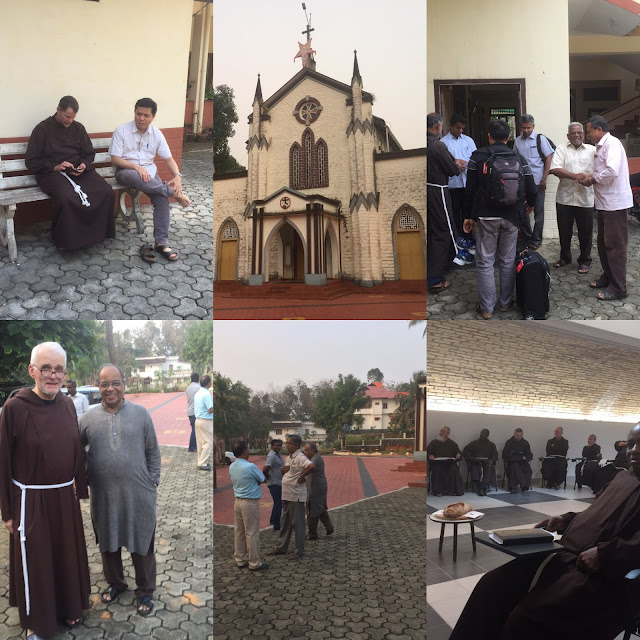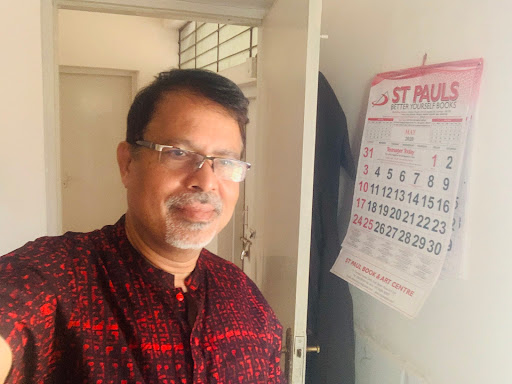On this third day of Easter Octave,
are you still languishing away in the tomb? Why do we remain in the tomb when the Lord has removed the stone away? Christ is risen but we are not!
That was the case of the downcast disciples at Emmaus. Why were they sad? They were disillusioned and had lost all hope. With the death of Jesus, their only hope had been snuffed out. They said, “Our own hope had been that he would be the one to set Israel free.” Hence, we read that they were moving away from Jerusalem like downtrodden and crushed soldiers retreating to a village called Emmaus. They could not integrate the death of Jesus in their lives, especially the death of a good man and the expected Messiah. With His tragic death, all plans collapsed. Not only could they not make sense of His unjust death but they also heard some strange happenings like the sighting of Jesus and the empty tomb

This is true for many of us. We cannot integrate pains and sorrows in our life, especially when we suffer tragedy, the loss of a loved one in death, accident, or a betrayal of friendship, particularly if it was our own spouse or our ungrateful children. At times, we suffer an expected illness that has no cure or even terminal. In such moments, we feel paralyzed, like the man who was crippled from birth. It must have been a terrible feeling not being able to walk since birth. He had to rely on some goodwill people daily to carry him to the Temple entrance “so that he could beg from the people going in.” We can presume that he would have often blamed God for his woes, which were no fault of his own. He could have cursed his parents for giving birth to him. He could have continued the blame game and wallowed in self-pity. Thus, when he saw Peter and John, it was with expectant eyes that he looked at them. He was looking for hope. We would probably have acted the same way had we been in the same situation. That is why we are still in our tomb of self-pity, resentment, anger and frustration.
At times, it could be the joys that we experience as well. We read that when the people saw the crippled man healed, they too could not understand. The most regrettable moment of an atheist is when he experiences something incredibly beautiful in his life; it could be a miraculous healing, a beautiful sunset or an experience of unconditional love, but he has no one to direct his praise and thanks. At least for the psalmist, when he experienced the mercy and love of God, he could sing and say, “Give thanks to the Lord, tell his name, make known his deeds among the peoples. O sing to him, sing his praise; tell all his wonderful works!”
Indeed, when we are not able to integrate our joys, we cannot be grateful and we do know whom to thank. If we are not grateful for what we have, we will not be happy in life. Only grateful people are happy people because they see everything they have as a blessing, a bonus and a grace; not their entitlement. Furthermore, we will also miss out on the mystery and the love of God as proclaimed in the responsorial psalm. The Israelites recognized the wonders of God in all things. They say, “Be proud of his holy name, let the hearts that seek the Lord rejoice. Consider the Lord and his strength; constantly seek his face. O children of Abraham, his servant, O sons of the Jacob he chose. He, the Lord, is our God: his judgements prevail in all the earth. He remembers his covenant forever, his promise for a thousand generations, the covenant he made with Abraham, the oath he swore to Isaac.” They knew that everything is by the mercy of God.
So it is important that we learn how to integrate both pains and joys in our lives and see it in the context of God’s plan for us if we are to live a meaningful and purposeful life.
How then can we find meaning in life, whether in our pains or sorrows? We need to seek the Lord! The psalmist says, “Let the hearts that seek the Lord rejoice.” Like the crippled man, we need to look towards the Lord. “Both Peter and John looked straight at him and said, ‘Look at us’. He turned to them expectantly, hoping to get something from them.” Instead of looking to the world for solution like the disciples, with eyes looking down, we must turn to the Lord instead.
How is this done if not through the scriptures? The meaning and direction of life is found in the Word of God. “All Scripture is God-breathed and is useful for teaching, rebuking, correcting and training in righteousness.” (
2 Tim 3:16) In the final analysis, all scriptures refer to Christ who is the Word of God. All scriptures must be read in such a way that it points to Christ, whether we are reading the Old or the New Testament. So if we want to find the Risen Lord and His direction for us in life, we only need to turn to the scriptures. We need to contemplate on His passion and resurrection to find strength in life.
Indeed, in the scriptures, the Risen Lord continues to speak to us. “Then they said to each other, ‘Did not our hearts burn within us as he talked to us on the road and explained the scriptures to us?’” He enlightens us on the truth of life. He helps us to see that the pain in our life is part of the process of God’s redemptive work. God is triumphant and He is in control. Most of all, He will help us understand that everything works for our good to those who have faith in Him. So in joy and sorrow, the Lord is with us. Even in those moments when we feel His absence, He is in truth carrying the cross for us. Otherwise, we will not have the strength to do so. With Jesus, nothing is impossible for those who believe. It was this faith that enabled St Peter to heal the crippled man.

What is the sign that we are integrated? When we begin to tell our stories! This is what we read about the disciples. “They set out that instant and returned to Jerusalem. There they found the Eleven assembled together with their companions, who said to them, ‘Yes, it is true. The Lord has risen and has appeared to Simon.’ Then they told their story of what had happened on the road.” Truly, when we find meaning and are able to integrate our pains in our lives, then we will be filled with joy like the disciples at Emmaus and the apostles. We would want to go out and announce the Good News too. For them, it meant that they were no more ashamed or sorry that Jesus died but they came to realize that the death of Jesus was but God’s way to reveal His true glory for humanity to see. Like the crippled man, we too can jump and shout for joy. When we are healed, we will no longer be ashamed of our failures, or our mistakes and past because we know that through all these trials, we have become wiser, stronger and better. Rather, like St Paul we could boast of our past.
And what is the best place to tell our story if not at the Eucharist? We read that the disciples came to recognize Christ at the breaking of bread. “Now while he was with them at table, he took the bread and said the blessing; then he broke it and handed it to them. And their eyes were opened and they recognised him; but he had vanished from their sight.” For what is the Eucharist, if not the commemoration of His passion and resurrection, the paschal mystery of our Lord? So in the celebration of the Eucharist, we remember once again the love of Christ in His passion and the wonderful miracle of the resurrection. This gives us courage and hope, especially in our trials and difficult moments of life. In the Eucharist, we celebrate the dying and rising, the integration of death and life.
Yet, it is significant that both the Word of God and the Sacrament of the Eucharist are not to be disconnected. Word and Sacrament must always go together. The liturgy of the Word and the Eucharist comprise a single celebration. Without the Word, the events are meaningless. But if there is no event, the Word is empty. What we hear, we must also experience as well. What is experienced must be understood. Emmanuel Kant once said, “Thoughts without content are empty; intuitions without conceptions blind.” Indeed, words without experience are empty and experience without words is blind. Indeed, in celebrating the Eucharist, the Lord comes close to us both in word and deed. “When they drew near to the village to which they were going, he made as if to go on; but they pressed him to stay with them. ‘It is nearly evening’ they said ‘and the day is almost over.’ So he went in to stay with them.”
Written by The Most Rev William Goh Roman Catholic Archbishop of Singapore © All Rights Reserved



















































